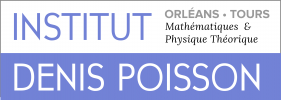Séminaire d'Analyse
Uniqueness and properties of bounded distributional solutions of non-local equations of porous medium typeEspen Jakobsen
Thursday 05 November 2015 11:00 - Tours - Salle 1180 (Bât E2)
Résumé :
Recently the group around J. L. Vazquez and others have obtained many results concerning the so-called fractional porous medium equations. These non-linear diffusion equations are degenerate, non-local, and can be written in the form: $u_t-L[\varphi (u)]=0$. Typically the diffusion operator ($L$) is a fractional Laplacian, the nonlinearity ($\varphi$) is of power type, and the class of solutions have finite energy. In this talk we will extend well-posedness results to any non-local symmetric(!) nonnegative diffusion operator, any continuous nondecreasing nonlinearity, and to solutions that a priori need not have finite energy. Such equations may be very degenerate, both in $L$ and $\varphi$, and include models of Stefan type and the full range of porous medium and fast diffusion non-linearities. We obtain uniqueness, stability, existence, compactness, a priori estimates - and then surprisingly and almost for free - convergence of natural (semi-discrete) numerical schemes. Our main results is the uniqueness result. This result is hard to prove because of our very general assumptions combined with a very weak solution concept, a combination that means that many classical techniques do not work. We will adapt a sort of "inverse energy" method of Brezis-Crandall to our nonlocal setting - but because of the generality of our diffusion operators - we cannot rely on explicit fundamental solutions for our proofs as in the local case. We have to develop part of the theory from scratch, using instead the equation and the regularity that comes with our solutions concept. A key tool is to approximate the possibly unbounded non-local operator by a bounded operator and then carefully pass to the limit. This proceedure, and hence also the proof, is truly nonlocal. The proof necessarily becomes much more involved than in the local case and includes a number of approximations, a priori estimates, L1-contraction estimates, comparison principles, compactness and regularity arguments, new Stroock-Varoupolous inequalities and Liouville type of results. Both our approach and intermediate results should be of independent interest. This is joint work with Jørgen Endal and Felix del Teso.
Liens :
